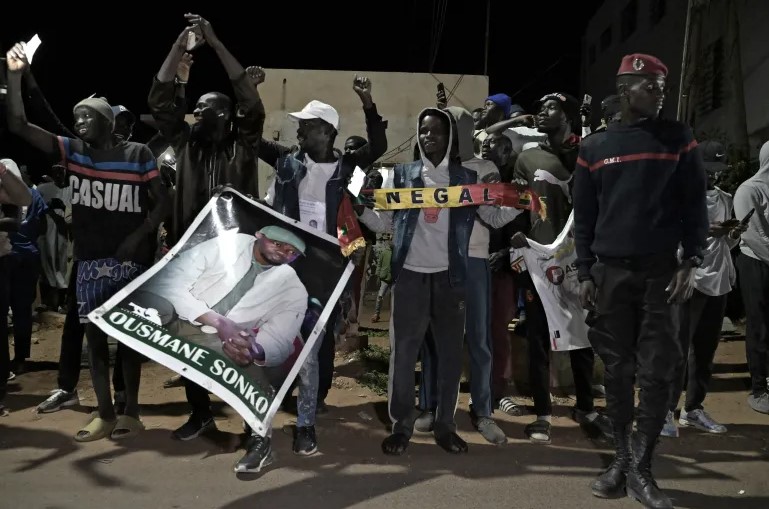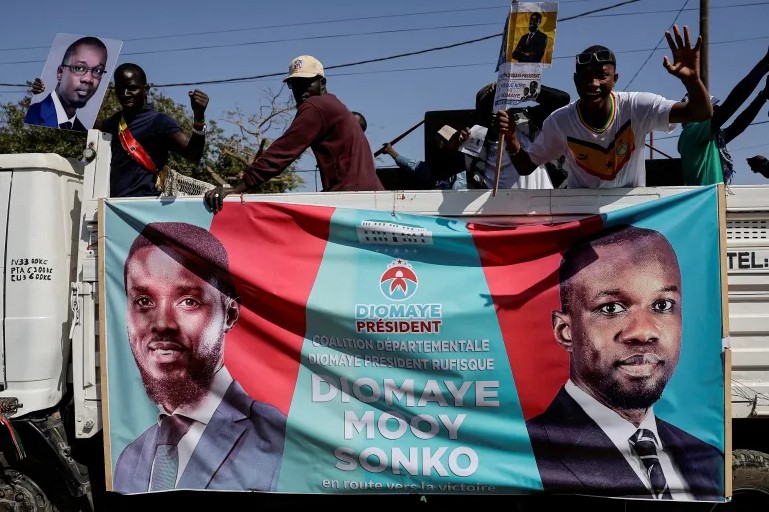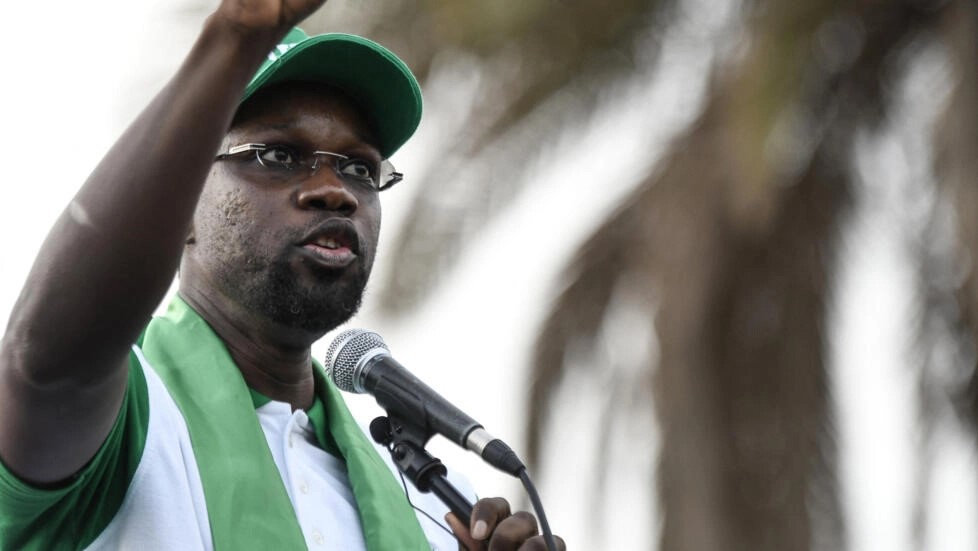A Granting of Amnesty
Following the passage of Senegalese President Macky Sall’s amnesty law, Ousmane Sonko and Bassirou Diomaye Faye, two of Senegal’s most prominent opposition figures, have been freed from prison. The two were freed under the law, which grants the ability for those arrested under political charges since 2021 to be released.
The two were welcomed by enormous crowds who gathered upon the news of their release spreading. Their release comes just over a week before the Presidential elections are to take place.

Ousmane Sonko, who was once thought to be one of if not the largest threat to the ruling party, holds extensive popularity with the nations youth. However, he had been in jail since July after being charged for “corrupting the youth.” Following the later upholding of a separate conviction for defamation by the nations’ supreme court on January 4th, Sonko was barred from running in the election. The conviction took place initially in March of 2023, where Sonko was handed a two month suspended sentence for the ‘defamation’ of Senegalese Tourism Minister Mame Mbaye Niang, who he had accused of embezzlement. In May, the sentence was extended to six months. Despite several convictions, Sonko was not arrested until July, which was met with protests throughout the nation. The defamation conviction was the one which prevented him from running in the election.
However his chosen successor, Bassirou Diomaye Faye, has been permitted to run in the elections. Similar to Sonko, Bassirou had been in jail since April of 2023, in provisional detention from a number of charges, including incitement to insurrection, but was freed under the amnesty law.
Although Bassirou is lesser known than Sonko, he comes from Sonko’s former party, the ‘African Patriots of Senegal for Work, Ethics and Fraternity’ (PASTEF, which was dissolved by the Senegalese government following Sonko’s imprisonment in July), and has enjoyed much of the same popularity that Sonko has. Although he, too, was in jail when the candidates list was created, since he was only in provisional detention he was permitted to run for election.

While the two were in jail, and even now, the message has spread that supporting Bassirou is supporting Sonko. The pair’s popularity may be enough to carry them to victory in the upcoming election, which is to take place on March 24th. The two were freed late on Thursday night, March 14th, giving them a mere 10 days in order to campaign and attempt to win the election. While many of their supporters would like to see Sonko in office, Bassirou is the only one able to run in the election.
A Long Journey
The Amnesty Law which freed both Sonko and Bassirou were a part of President Sall’s attempted political reconciliation after a several week long political crisis spawned by the governments attempted delay of the Presidential elections. Originally, the election was to be held on February 25th, however was delayed by the government on February 5th all the way until December 15th, pending a parliamentary inquiry into the independence of two judges of the Constitutional Court after they barred two key opposition candidates, Ousmane Sonko and Karim Wade, from running in the election.
The move was immediately met by protests nation wide which witnessed the arrest of hundreds, injuring of dozens, and deaths of three during clashes between protestors and police. The Constitutional Court struck down the delay on February 15th, and stated that while returning to the February 25th timeline would be “impossible”, that the government should seek to hold elections “as soon as possible.”

President Sall hosted a national dialogue commission aimed at defusing political tensions within the nation, which were at a distinct high, which proposed an election date of June 2nd. The Constitutional Court ruled that the date would be illegal due to it taking place after President Sall’s term is due to end on April 2nd, prompting the government to then set elections for March 24th.
Many opponents have claimed that the charges against both Bassirou and Sonko are politically motivated. Opponents also claim that the ruling party was attempting to delay the election due to them fearing losing it, not in the aim of holding “an open national dialogue to bring together the conditions for a free, transparent, and inclusive election” as the government claimed.
March 24th
It is unclear how the March 24th elections will go. While both Bassirou and Sonko hold extensive popularity, in particular with the nations youth, they have a noticeably short amount of time to campaign for their election. Sonko previously ran for President in 2019, in which he came third.
Bassirou is running on a platform to create a new national currency (Senegal presently uses the West African Franc), renegotiate contracts with private mining and energy companies (notably, Sonko previously has worked to expose corruption amongst some of the foreign companies operating within Senegal), as well as a general review of relations with France, who many of Senegal’s youth view as neo-colonialist.

France has been taking a number of relational hits in west Africa in the past several years, mostly at the hands of coups taking place in several different west African nations.
Bassirou remains a likely winner of the upcoming election, however only time will tell if him and Sonko can pull off a victory.
President Sall and the ruling party have put forward Senegalese Prime Minister Amadou Ba as their chosen candidate, however it is likely that Ba will suffer some popularity at the polls due to the severe popularity hit that the ruling party has taken amidst the nations political crisis in the last several weeks.
An Oppositionist Barred: Who is Ousmane Sonko..?
Sonko is one of the leading oppositionists against Senegalese President Macky Sall. He founded the Senegalese political party the ‘African Patriots of Senegal for Work, Ethics and Fraternity’ (PASTEF), and prior to his entry into politics worked as a tax inspector, during which he exposed a Canadian company using mineral sands processing plants in Senegal as offshore tax havens. He was terminated as a tax inspector after this.
In 2014, he founded PASTEF, and eventually served as a member of the National Assembly from 2017-2022. In 2019 he ran for President, and came in 3rd place against President Macky Sall with 16% of the vote. During 2022 local elections, his political coalition saw some successes against Sall’s coalition. During parliamentary elections in the same year they managed to garner a third of the total seats in the National Assembly.

Sonko’s critics have accused him of holding connections with the Muslim Brotherhood. Politically, Sonko pushes for tax reform, tougher laws on homosexuality (which is already criminalized in Senegal), as well as expanded use of the death penalty.
In March 2021, Sonko was arrested over alleged rape charges from a worker at a massage parlor, charges he said were falsified and politically motivated. His initial arrest sparked protests which saw a hefty crackdown by the government, and resulted in the deaths of at least 13 people, and the arrest of many more. A few days after protests began, Sonko was released but under the condition he could not leave the country.
Two years later, on June 1st 2023, Sonko was cleared of the rape charges, however instead was charged with “corrupting the youth”, and sentenced to two years in prison. He was not arrested until July 28th. His party, PASTEF, was dissolved by the government only 3 days later on July 31st. His arrest and the dissolution of his party triggered renewed nation-wide protests, during which the government banned tik-tok. Sonko was hospitalized on August 6th after beginning a hunger strike in protest of his re-arrest.


